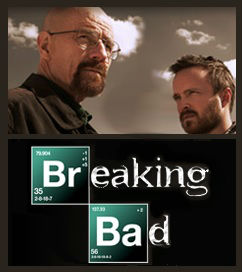Badly Broken: We Are Walter White
 I’ll bet tonight’s blog traffic will drop sharply, and explode on Twitter — and at 9:00 p.m. EDT exactly. That’s when the last episode of AMC’s Breaking Bad will air, following a 61-hour marathon of all preceding episodes from the last five years.
I’ll bet tonight’s blog traffic will drop sharply, and explode on Twitter — and at 9:00 p.m. EDT exactly. That’s when the last episode of AMC’s Breaking Bad will air, following a 61-hour marathon of all preceding episodes from the last five years.
A friend expressed concern and astonishment at the public’s investment in this cable TV program, versus the Intergovernmental Panel on Climate Change’s Fifth Assessment Report published Friday, expressing heightened confidence in anthropogenic climate change:
“The report increases the degree of certainty that human activities are driving the warming the world has experienced, from “very likely” or 90% confidence in 2007, to “extremely likely” or 95% confidence now.” [source]
He’s right; we’ll be utterly absorbed by the conclusion of former high school chemistry teacher and cancer patient Walter White’s tale. We’ll have spent a fraction of intellectual energy on our own existential threat, in comparison to the mental wattage we’ll expend on a fictional character’s programming mortality.
But perhaps Breaking Bad’s very nature offers clues to our state of mind. Viewers are addicted to a program that upends perspectives and forces greater examination.
— The entire story of Walter White, a middle class white guy with a good education whose cancer threatens his life and his family’s long-term financial well-being, would not be viable were it not for the dismal state of health care in America. There are no Walter Whites in Canada, for example; the U.S. has become little better than a third world narco-state, our health and shelter dependent on ugly choices like crime because our system of governance cannot respond appropriately under pressure for corporate profitability.
We cling to White, though he has become the very thing we pay our law enforcement to battle, because he is us — morally conflicted, trying to safeguard our lives and our families in a deeply corrupt system. At the end of each Breaking Bad episode the distortion of our values is evident in viewers’ failure to reject a criminal character depicting a drug lord manufacturing and selling a controlled substance, while guilty of conspiracy, murder, and racketeering in the process.
In the background as we watch this program, we permit corporate-owned congresspersons to shut down our government in a fit of pique over the illusion of better health care for all.
— Like White, the existential threats we face are ignored once we reach a degree of stasis. White gets treatment for cancer, which goes into remission. But he has become hooked on the money, the power, the rush that comes with this new dark world he has entered. No day is the same, unlike that of the meek, mild-mannered chemistry teacher’s world he once inhabited. With this addiction comes new existential threats that in turn increase the likelihood the original cancer will return. The meth White began to cook to resolve his cancer has become a new cancer in itself.
We are in similar straits: though we’ve been informed for decades that our consumption and incumbent pollution is problematic, we have become addicted to newer, better, faster anything, adopting a culture of disposability, if we can just have our next new fix whether it’s a car, a computer, a cellphone, pick it, it’s all ultimately petroleum and rare minerals assembled using the sweat and blood of the poor. We’ll keep consuming in spite of the fact that our consumption is threatening our way of life.
We are become Death, the destroyer of worlds.
Well, this one in particular. We toy with the notion of expanding our empire to the moon and Mars.
— White does this for his family, he says all along. So do we; we stay in our narrow grooves, consuming as we travel forward, telling ourselves we are making jobs, increasing productivity, improving standards of living for ourselves and our loved ones. Yet the truth is quite the opposite. What we are doing within our well-worn track in the rat race is as destructive as it is clueless. We are not happier; we are sicker; we are less well-off.
Because family, we say. And better living through chemistry.
Ultimately, as we peer into our own black monolithic mirrors tonight, watching Walter White or tweeting about him, we see our addicted selves, our troubled families, our malignant government, our sickened world. Art imitates life — it’s a very ugly piece of work reflected in Breaking Bad, were we to see past the superficial bread and circuses to the truth within.
[Pssst…Netflix prepared a Spoiler Foiler tool to filter Breaking Bad spoilers out your Twitter timeline.]